(House of bhakti) – Who can give prema?

An excerpt from a morning walk with Śrīla Bhaktivedānta Nārāyaṇa Mahārāja in Govardhana, India, on August 9, 2009, published in Walking with a Saint – Morning Walks and Conversations 2009
Ariṣṭāsana dāsa: Some persons in ISKCON challenge your statement about Śrīla Haridāsa Ṭhākura not being able to give prema. They told me, “If you say that Haridāsa Ṭhākura cannot give kṛṣṇa-prema, then why does it say in Harināma Cintāmaṇi that…
Śrīla Bhaktivedānta Nārāyaṇa Mahārāja: He is able to give kṛṣṇa-prema, but he cannot give parakīya-madhura-rasa (service to the amorous paramour love between Kṛṣṇa and the gopīs). I explained that he was an associate of Śrī Caitanya Mahāprabhu and he was chanting the holy name, but his chanting and his bhakti were not like that of Śrīla Rūpa Gosvāmī. He was not rūpānuga; he was nāmācārya. He may give kṛṣṇa-prema, but he cannot give upapati mādhurya-bhāva (service to the amorous paramour love of Kṛṣṇa and the gopīs).
Ariṣṭāsana dāsa: He cannot give vraja-prema?
Śrīla Bhaktivedānta Nārāyaṇa Mahārāja: Especially not the upapati-bhāva of the gopīs.
Ariṣṭāsana dāsa: They said that if your statement is correct, then how is it that Haridāsa Ṭhākura explained the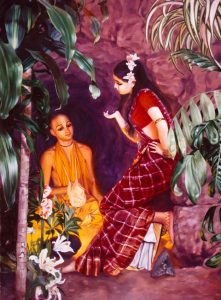 ekadāsa-bhāvas (the eleven moods of service for the devotee performing rūpānuga-bhajana)? How is it that he explained that the highest sādhya (goal of life) is service to Śrīmatī Rādhārāṇī as a mañjarī?
ekadāsa-bhāvas (the eleven moods of service for the devotee performing rūpānuga-bhajana)? How is it that he explained that the highest sādhya (goal of life) is service to Śrīmatī Rādhārāṇī as a mañjarī?
Śrīla Bhaktivedānta Nārāyaṇa Mahārāja: He can describe it, but he cannot bestow it. Someone may be able to describe upapati-bhāva, but this does not mean that such a person can give it.
Vrajanātha dāsa: Gurudeva, Haridāsa Ṭhākura is an incarnation of Prahlāda Mahārāja and Brahmājī.
Śrīla Bhaktivedānta Nārāyaṇa Mahārāja: He is the combination of Brahmā and Prahlāda Mahārāja.
Vrajanātha dāsa: Brahmā is the ādi-guru (first guru) in our sampradāya.
Śrīla Bhaktivedānta Nārāyaṇa Mahārāja: Still, without being rūpānuga, no one can attain that gopī mood.
Ariṣṭāsana dāsa: I read your book called Five Essential Essays: Refuting Common Misconceptions in our Vaisnava Community. There you quote the Sanat-kumāra-saṁhitā saying that Śivajī taught Nāradajī that one should meditate on one’s mañjarī form.
Śrīla Bhaktivedānta Nārāyaṇa Mahārāja:
vṛndāvanāvani-pate! jaya soma soma-maule
sanaka-sanandana-sanātana-nāradeḍya
gopīśvara! vraja-vilāsi-yugāṅghri-padme
prema prayaccha nirupādhi namo namas te
(Saṅkalpa-kalpadruma 103, by Śrīla Viśvanātha Cakravartī Ṭhākura)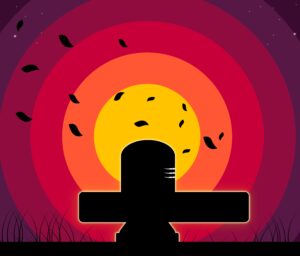
[“O Soma, all glories to you! O you whose forehead is decorated with the moon, and who is worshipable for the sages headed by Sanaka, Sanandana, Sanātana and Nārada! O Gopīśvara!
Desiring that you bestow upon me prema for the lotus feet of Śrī Śrī Rādhā-Mādhava, who perform joyous pastimes in Vraja-dhāma, I offer praṇāma unto you time and again.”]
He can give prema.
 An excerpt from a morning walk with Śrīla Bhaktivedānta Nārāyaṇa Mahārāja in Alachua, Florida, on April 29, 2008, published in Walking with a Saint – Morning Walks and Conversations 2008
An excerpt from a morning walk with Śrīla Bhaktivedānta Nārāyaṇa Mahārāja in Alachua, Florida, on April 29, 2008, published in Walking with a Saint – Morning Walks and Conversations 2008
Śrīla Bhaktivedānta Nārāyaṇa Mahārāja: Śrī Caitanya Mahāprabhu’s associates like Śrīla Rāya Rāmānanda, 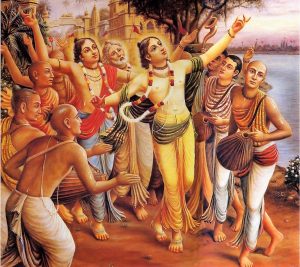 Śrīla Svarūpa Dāmodara, and Śrīla Rūpa Gosvāmī descended from Goloka Vṛndāvana to explain the moods of Śrī Caitanya Mahāprabhu. This is why they came. Just as Kṛṣṇa does not come to this world alone, Mahāprabhu also does not come alone.
Śrīla Svarūpa Dāmodara, and Śrīla Rūpa Gosvāmī descended from Goloka Vṛndāvana to explain the moods of Śrī Caitanya Mahāprabhu. This is why they came. Just as Kṛṣṇa does not come to this world alone, Mahāprabhu also does not come alone.
Śrīpāda Padmanābha Mahārāja: Śrīla Gurudeva, many years ago, when we were in Fiji on Śrī Advaita Ācārya’s appearance day, you were asking each of us to speak about the pañca-tattva. You asked, “Can Advaita Ācārya give vraja-prema? Can Gadādhara Paṇḍita or Nityānanda Prabhu give it? You then explained that all of them can give prema because they are all there in Goloka Vraja; Nityānanda Prabhu is there as Anaṅga Mañjarī and Balarāma, and Advaita Ācārya is there as Gopīśvara Mahādeva and Sadāśiva.
Śrīla Bhaktivedānta Nārāyaṇa Mahārāja: Only Gadādhara Paṇḍita can give prema as Śrī Caitanya Mahāprabhu gave it. While the others can also give it, Mahāprabhu and Gadādhara Paṇḍita give it better.
Sugata dāsa: Why is that so?
Śrīla Bhaktivedānta Nārāyaṇa Mahārāja: Śrī Kṛṣṇa is viṣaya-vigraha (the object of bhakti) and Gadādhara is āśraya-vigraha (the reservoir, or container, of bhakti). Gadādhara, who is Rādhikā Herself, can therefore give it better than Śrī Caitanya Mahāprabhu. With Gadādhara Paṇḍita’s help, Mahāprabhu is able to give it better than the others, because He is Kṛṣṇa who is now realizing the love of Śrīmatī Rādhikā. He has taken Her beauty and intrinsic mood.
Sugata dāsa: But first we approach guru and Nityānanda Prabhu?
Śrīla Bhaktivedānta Nārāyaṇa Mahārāja: Yes, that is right.
A madhyama-adhikārī guru knows everything about our conditioning in this world and our suffering due to being absorbed in worldly conceptions. His mercy comes first*, then the mercy of Śrī Nityānanda Prabhu and the uttama-adhikārīs’ mercy, and then Śrīman Mahāprabhu’s and Śrī Kṛṣṇa’s mercy.
*A madhyama-adhikārī guru can only give the highest mercy when he is an uttama-adhikārī
in the role of a madhyama – ed.

The following is a transcription of a lecture delivered by Śrīla Bhaktivedānta Nārāyaṇa Mahārāja in Cessnock, Australia, on February 25, 2002
Vrajanātha dāsa: What was the dam that blocked the mercy?
Śrīla Bhaktivedānta Nārāyaṇa Mahārāja: It was ‘time’. Kṛṣṇa wanted to come here as Mahāprabhu and taste love and affection, but when He would come, how He would come, and who would assist Him, was not determined.
If anyone chants, Nityānanda Prabhu will at once give prema. He went to Jagāi and Mādhāi, two bogus persons who would not agree to chant the holy name, and told them, “You must chant.” 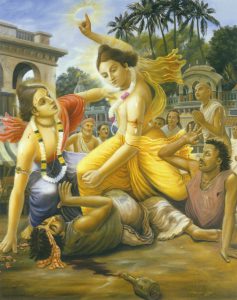 Jagāi and Mādhāi immediately attacked Him upon hearing His words, but still He gave them kṛṣṇa-prema. The ocean was blocked – within Caitanya Mahāprabhu – but Nityānanda Prabhu broke the dam. He told Mahāprabhu, “Don’t kill them. You cannot kill anyone in this incarnation. You are obliged not to kill. You have come to give prema and You have promised to give it, so please fulfil Your promise.” Thus, if you take shelter of Nityānanda Prabhu, you will be free of all problems very quickly.
Jagāi and Mādhāi immediately attacked Him upon hearing His words, but still He gave them kṛṣṇa-prema. The ocean was blocked – within Caitanya Mahāprabhu – but Nityānanda Prabhu broke the dam. He told Mahāprabhu, “Don’t kill them. You cannot kill anyone in this incarnation. You are obliged not to kill. You have come to give prema and You have promised to give it, so please fulfil Your promise.” Thus, if you take shelter of Nityānanda Prabhu, you will be free of all problems very quickly.
Devotee: You said that if we take shelter of Lord Nityānanda, all problems go away. Exactly how does one take shelter of Lord Nityānanda?
Śrīla Bhaktivedānta Nārāyaṇa Mahārāja: In this world we take shelter of Kṛṣṇa by practising the six limbs of śaraṇāgati, and this also applies to Nityānanda Prabhu. We pray, “I have offered my life and everything I possess at Your lotus feet. I have so much faith in You.”
ānukūlyasya saṅkalpaḥ
prātikūlyasya varjanam
rakṣiṣyatīti viśvāso
goptṛtve varaṇaṁ tathā
ātma-nikṣepa-kārpaṇye
ṣaḍ-vidhā śaraṇāgatiḥ
(Hari-bhakti-vilāsa)
[“The six divisions of surrender are the acceptance of those things favourable to devotional service, the rejection of unfavourable things, the conviction that Kṛṣṇa will give protection, the acceptance of the Lord as ones’ guardian or master, humility, and full self-surrender.”]
If Kṛṣṇa is supporting, nourishing, and saving us, why worry? All tattvas (established philosophical truths) will come, renunciation will come, and all your misfortune will go away. Suppose you want worldly happiness,  considering that worldly paraphernalia, relationships and attachments are good, and thinking, “I should have so much money.” What will Nityānanda Prabhu do? He will take away all these attachments and give you transcendental love. He knows how you can get this love. He will not act according to your advice; He is not your subordinate. He will not come to you and say, “What should I do for you so that you can be happy?” Rather, He will perform a major operation, or a minor operation, or He may just give you transcendental love and affection.
considering that worldly paraphernalia, relationships and attachments are good, and thinking, “I should have so much money.” What will Nityānanda Prabhu do? He will take away all these attachments and give you transcendental love. He knows how you can get this love. He will not act according to your advice; He is not your subordinate. He will not come to you and say, “What should I do for you so that you can be happy?” Rather, He will perform a major operation, or a minor operation, or He may just give you transcendental love and affection.
Vrajanātha dāsa: We see that sometimes those who present themselves as devotees get wealth and position – perhaps because they chant with aparādha?
Śrīla Bhaktivedānta Nārāyaṇa Mahārāja: That depends on the devotee. Sometimes wealth and position come 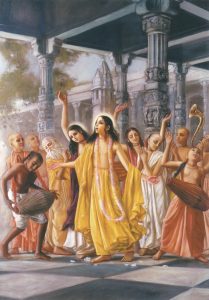 by nāmābhāsa or nāmāparādha, but how did so much opulence come to Yudhiṣṭhira Mahārāja? It did not come as a result of an offence. Yudhiṣṭhira wanted to serve Kṛṣṇa. He wanted to give inspiration to the whole world, saying, “If you worship Kṛṣṇa, you will not be a beggar.” But the example of Mahārāja Yudhiṣṭhira is very rare.
by nāmābhāsa or nāmāparādha, but how did so much opulence come to Yudhiṣṭhira Mahārāja? It did not come as a result of an offence. Yudhiṣṭhira wanted to serve Kṛṣṇa. He wanted to give inspiration to the whole world, saying, “If you worship Kṛṣṇa, you will not be a beggar.” But the example of Mahārāja Yudhiṣṭhira is very rare.

The following is an excerpt from Pinnacle of Devotion, 2nd edition, a conversation with Śrīla Bhaktivedānta Nārāyaṇa Mahārāja during the Gaura Pūrṇimā festival at the Devānanda Gauḍīya Maṭha, on March 15, 1997, in Navadvīpa, India
Devotee: Even if one is chanting millions of holy names, is it only through the mercy of guru that he can have 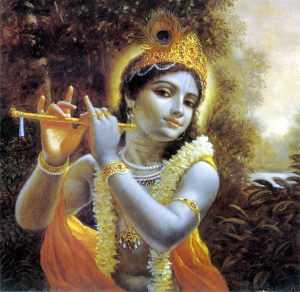 pure nāma?
pure nāma?
Śrīla Bhaktivedānta Nārāyaṇa Mahārāja: It is by the mercy of Śrī Kṛṣṇa and the śuddha-bhakta or pure devotee. What you are telling, what you are understanding, what you are thinking is the holy name – that nāma is not the holy name. A light bulb is not the sun. Those who have no superior sādhu-saṅga, whose hearts are not pure, who have not received the mercy of Śrī Kṛṣṇa, and who do not have the help of a guru will not be able to chant this pure name. It is only words from a dictionary. Nāma is present.* When nāma illuminates Himself in our heart, then it is understood that Kṛṣṇa has come. Then we will not be able to check our tongue or our mind from chanting continuously, automatically, day and night, as Caitanya Mahāprabhu did. At that time it may be said that we are chanting the pure holy name.
Devotee: Gurudeva, at that time does one see Śrī Kṛṣṇa?
Śrīla Bhaktivedānta Nārāyaṇa Mahārāja: One śuddha-kṛṣṇa-nāma will give prema, and then we can see Him.
Devotee: When we chant pure nāma, will Śrī Kṛṣṇa appear before us?
Śrīla Bhaktivedānta Nārāyaṇa Mahārāja: We cannot make Śrī Kṛṣṇa appear by our chanting endeavour. Kṛṣṇa Himself will appear on our tongue and dance there when we chant śuddha-nāma. With faith, we should try to chant at least nāmābhāsa.
Those who do not read the books of our Gauḍīya Vaiṣṇava ācāryas like Śrīla Bhaktivinoda Ṭhākura will not be able to explain this vividly. If disciples are only crying, “Guru, guru, guru,” they will not understand this principle. If one thinks he should only know his own guru, and that there is no need to know Śrīla Bhaktivinoda Ṭhākura, Śrīla Bhaktisiddhānta Sarasvatī Ṭhākura, our Gurudeva Śrīla Bhakti Prajñāna Keśava Mahārāja, Śrīla Viśvanātha Cakravartī Ṭhākura, Śrīla Rūpa Gosvāmī, or Śrīla Sanātana Gosvāmī in order to know Kṛṣṇa, this is offensive thinking.
Devotee: One must weep for the mercy of guru and Vaiṣṇavas in order to be able to chant the pure name. But as conditioned souls, proud and full of anarthas and aparādhas, how do we develop a mood of weeping for the mercy of the Lord?
Śrīla Bhaktivedānta Nārāyaṇa Mahārāja: By always serving śuddha-guru, śuddha-vaiṣṇavas, śuddha-nāma, and engaging in devotional practices, in no time you will be a pure devotee. Do not give time for anarthas and aparādhas. In other words, we should be so engaged that we do not have time to dwell on past anarthas and aparādhas, nor should we have time to involve ourselves in committing new ones.
With a mood of service to śrī guru, Śrī Kṛṣṇa, and the Vaiṣṇavas, and with an understanding that Kṛṣṇa’s name is Kṛṣṇa Himself, one should serve them by chanting day and night. If we serve and hear from those who are chanting śuddha-nāma, our chanting of nāmābhāsa will go away and the pure name will appear for us.
*Our ācāryas like Śrīla Bhaktivinoda Ṭhākura, Śrīla Narottama dāsa Ṭhākura and others petition the Lord for His mercy in their prayers begging for the holy name. For example, in the song Jīva-jāgo, Śrīla Bhaktivinoda Ṭhākura writes, “Ṭhākura Bhaktivinoda fell at the lotus feet of Lord Gaurāṅga, and after begging for the holy name he received that mahā-mantra.” In the song Emona Durmati, Srila Bhaktivinoda Ṭhākura prays, “O Lord, I am falling at the soles of Your feet, weeping and weeping for the holy name”.

The following is an excerpt from The Essence of All Advice, 4th Edition, a collection of discourses by Śrīla Bhaktivedānta Nārāyaṇa Mahārāja on the Nectar of Instruction, Śrīla Bhaktivedānta Svāmī Prabhupāda’s commentary on Śrī Upadeśāmṛta by Śrīla Rūpa Gosvāmī
Devotee reads: And, in every respect, her divine kuṇḍa is described by great sages as similarly dear to him. Undoubtedly Rādhā-kuṇḍa is very rarely attained even by the great devotees; therefore it is even more difficult for ordinary devotees to attain. If one simply bathes once within those holy waters, one’s pure love of Kṛṣṇa is fully aroused.
Śrīla Bhaktivedānta Nārāyaṇa Mahārāja: He has given hope and we should trust in his words. Purport.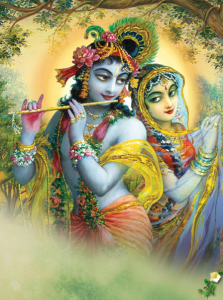
Devotee reads: Why is Rādhā-kuṇḍa so exalted? The lake is so exalted because it belongs to Śrīmatī Rādhārāṇī, who is the most beloved object of Śrī Kṛṣṇa.
Śrīla Bhaktivedānta Nārāyaṇa Mahārāja: I think that this kuṇḍa is Herself Śrīmatī Rādhikā, not that it belongs to Her. He has written this only so that we can easily understand this thing. Rādhā-kuṇḍa is Herself Rādhikā, and Kṛṣṇa-kuṇḍa is Himself Śrī Kṛṣṇa. Rūpa Gosvāmī has said that these kuṇḍas are even more merciful than Kṛṣṇa and Rādhikā, because these kuṇḍas are manifest. We can touch them and take a bath in them. We cannot realize transcendental Kṛṣṇa and Rādhikā, so these kuṇḍas are most merciful to us.
Even if we do not know the glory of Rādhā-kuṇḍa and Śyāma-kuṇḍa, but go there and with honour take water and sprinkle it on us, take bath, or glorify Śrīmatī Rādhikā, Rādhikā will be very pleased, certainly. And we can have the mercy of Rādhā-kuṇḍa by going there, or living here and in our minds taking a bath and doing a very simple meditation, “Rādhā-kuṇḍa, Rādhā-kuṇḍa.” In this way something will come to us.
Devotee: In our conditioned state are we really touching Rādhā-kuṇḍa when we bathe there?
Śrīla Bhaktivedānta Nārāyaṇa Mahārāja: Really or not, the heart touches a little, no harm, no harm. Rādhā-kuṇḍa and Śyāma-kuṇḍa are so powerful. Nārada has received the benediction that if anyone touches, sees or hears about any place of Kṛṣṇa’s pure pastimes, Kṛṣṇa will have to give prema.
“You are bound to give.” Kṛṣṇa vows, “Yes, I am bound.”

The following is an excerpt from Śrī Guru Vandanā – In Veneration of Śrī Guru (Rays of the Harmonist), a collection of discourses by Śrīla Bhaktivedānta Nārāyaṇa Mahārāja at Śrī Keśavajī Gauḍīya Maṭha on May 7,8 & 9, 1991, in Mathurā, India
Śrī Caitanya Mahāprabhu served Girirāja in His own mood, but how did Śrīla Raghunātha dāsa Gosvāmī serve? He served Girirāja as one who gives prema for Rādhā and Kṛṣṇa. He has written somewhere, or perhaps Śrīla Rūpa Gosvāmī has written, that in Vṛndāvana there are two personalities who can give prema for Rādhā and Kṛṣṇa: Girirāja-Govardhanajī and Yamunājī. Both are mentioned as those who grant such prema. This was how he served Girirāja, and it is this form that is beneficial for us.
If someone sees Kṛṣṇa Himself as Girirāja, then it is somewhat problematic. Kṛṣṇa cannot give Himself fully to anyone, because He does not belong to Himself. Everything that was His – His body and belongings – He gave to Śrīmatījī. He has nothing left to give. That is why, if these personalities [such as Girirāja and Yamunā] are inclined to give something, they have the power to give Him in His entirety. Kṛṣṇa cannot give Himself fully.
It is for this reason that this mood of service is mentioned in our sampradāya. Hence, we too shall serve Girirāja in this manner as he who grants prema for Rādhā and Kṛṣṇa. By serving him, one can attain that prema. He is the giver. “Nirupadhi-karuṇena śrī-śacīnandanena tvayi kapaṭi-śaṭho ’pi tvatpriyeṇārpito ’smi – The causelessly merciful Śrī Śacīnandana, who is most dear to you, has offered me to you. I am kapaṭa (deceitful), but whatever I am, I am yours, so, please accept me.” Girirāja accepts even our kapaṭatā, our deceitfulness. If we submit our everything at his feet, he will surely bestow kṛṣṇa–prema upon us.

The following is an excerpt from Śrī Hari-kathāmṛta Volume One, Chapter Four, by Śrīla Bhaktivedānta Nārāyaṇa Mahārāja
Some devotees worship Govardhana as Kṛṣṇa himself, but in the Gauḍīya sampradāya we worship him as a great devotee, not as Bhagavān, because as a devotee he can bestow the prema-rasa that is displayed there. If he is Bhagavān, then he cannot give that prema that Rādhikā and her girlfriends and even their devotees can give. Therefore devotees always aspire to go to Girirāja Govardhana, who has witnessed all of Rādhā-Kṛṣṇa’s pastimes.
Devotees know that Girirāja Govardhana can bestow that prema which is relished by Śrī Śrī Rādhā-Kṛṣṇa and 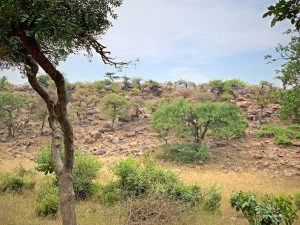 which Śrī Caitanya Mahāprabhu descended to distribute and to taste himself. Therefore Svāmījī, like Rūpa Gosvāmī, Śrīla Bhaktisiddhānta Sarasvatī Gosvāmī Prabhupāda and my own worshipable gurudeva, Śrīla Bhakti Prajñāna Keśava Gosvāmī Mahārāja, also wanted residence near Govardhana. Govardhana is the best place in Vraja for both sādhakas and siddhas. If a sādhaka who does not have prema does bhajana there, he will get prema, and if a perfected devotee goes there, he will relish Rādhā-Kṛṣṇa’s nitya-līlā. He will also receive darśana of the mahābhāva that is most dear to Rādhā-Kṛṣṇa and that he himself also aspires to attain. It cannot be attained anywhere else.
which Śrī Caitanya Mahāprabhu descended to distribute and to taste himself. Therefore Svāmījī, like Rūpa Gosvāmī, Śrīla Bhaktisiddhānta Sarasvatī Gosvāmī Prabhupāda and my own worshipable gurudeva, Śrīla Bhakti Prajñāna Keśava Gosvāmī Mahārāja, also wanted residence near Govardhana. Govardhana is the best place in Vraja for both sādhakas and siddhas. If a sādhaka who does not have prema does bhajana there, he will get prema, and if a perfected devotee goes there, he will relish Rādhā-Kṛṣṇa’s nitya-līlā. He will also receive darśana of the mahābhāva that is most dear to Rādhā-Kṛṣṇa and that he himself also aspires to attain. It cannot be attained anywhere else.
There are three personalities in Vṛndāvana who can give prema: Lalitā, Girirāja Govardhana, and the Yamunā. Therefore devotees take shelter of these three and thus try to become eternal maidservants of Rādhikā and gain her favour. I also desire to take shelter of Girirāja Govardhana with these aspirations in mind.
yatraiva gaṅgām anu nāvi rādhām
ārohya madhye tu nimagna-naukaḥ
kṛṣṇo hi rādhānugalo babhau sa
govardhano me diśatām abhīṣṭam
Śrī Govardhanāṣṭakam 7
“In Mānasī-gaṅgā, which has arisen from the heart of Śrī Govardhana, Śrī Kṛṣṇa induced Śrī Rādhikā to sit in his boat. In the middle of the lake, Kṛṣṇa nearly caused the boat to sink. Out of fear, Śrī Svāminījī threw her arms around his neck and tightly embraced him. May that Śrī Govardhana fulfil all my desires.”

Chapter 9 from the book, Going Beyond Vaikuṇṭha, 4th edition by Śrīla Bhaktivedānta Nārāyaṇa Mahārāja
Bhagavān has so many forms, and all are hatāri-gati-dāyaka. What does that mean? Those demons and enemies who are personally killed by Him are given a high destination. Rāmacandra, Nṛsiṁha, Varāha, Paraśurāma and all other incarnations are hatāri-gati-dāyaka. The five qualities that are found in Bhagavān and not found in the demigods are found to the highest degree in Kṛṣṇa. In Nārāyaṇa and the incarnations these qualities are complete (pūrṇa), but in Kṛṣṇa they are most complete (pūrṇatama). When any incarnation from Nārāyaṇa up to Nṛsiṁha kills someone, what destination do They give to those They have killed? Sutala, Svarga, Brahmaloka, all kinds of destinations. And They will also give liberation, mukti, to some enemies killed by Them. According to how someone has approached Them, They will give a particular destination to that person.
For example, in rāma-līlā there was Śarbaṅga Ṛṣi, who was worshipping the impersonal brahma. He heard that Rāmacandra was coming, and thinking that Rāma was the personification of brahma, he waited for Him. After the sage waited for some time, Rāmacandra finally came and gave His darśana to him. Being very pleased, the sage said, “O Lord, give me my desired destination.” Then from the sage’s body a light came out, and that light entered the body of Rāmacandra and the sage attained liberation. He was such an unfortunate man: he received the direct darśana of Rāmacandra and he merely asked for liberation! Therefore Rāma will give liberation. Many incarnations will give it, but to those who approach Them as enemies, these incarnations will not give prema.
What is real liberation? According to Śrīmad-Bhāgavatam it is svarūpeṇa vyavasthitiḥ: that liberation which bestows service to the feet of Bhagavān, which is the highest destination. Those incarnations will not give this 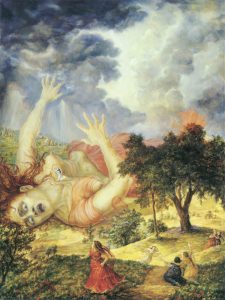 type of mukti. Especially They will not give it to those enemies whom They have killed. Nṛsiṁha killed Hiraṇyakaśipu, and Varāha killed Hiraṇyākṣa, yet neither of these demons obtained liberation in that birth. But Kṛṣṇa killed numerous demons and not only gave them liberation, to some He even gave prema! Like Pūtanā: she approached Kṛṣṇa in the guise of a mother, so He gave her a motherly position in Vraja. She didn’t directly become Kṛṣṇa’s mother; she was given a position in Goloka as an elderly dāsī, one who feeds Kṛṣṇa milk. Otherwise there would be a problem – she would be equal to Yaśodā, but that isn’t the case. She went to Goloka as a dāsī. This type of liberation Kṛṣṇa can give, and no other incarnation can give it.
type of mukti. Especially They will not give it to those enemies whom They have killed. Nṛsiṁha killed Hiraṇyakaśipu, and Varāha killed Hiraṇyākṣa, yet neither of these demons obtained liberation in that birth. But Kṛṣṇa killed numerous demons and not only gave them liberation, to some He even gave prema! Like Pūtanā: she approached Kṛṣṇa in the guise of a mother, so He gave her a motherly position in Vraja. She didn’t directly become Kṛṣṇa’s mother; she was given a position in Goloka as an elderly dāsī, one who feeds Kṛṣṇa milk. Otherwise there would be a problem – she would be equal to Yaśodā, but that isn’t the case. She went to Goloka as a dāsī. This type of liberation Kṛṣṇa can give, and no other incarnation can give it.
Those that are killed by Bhagavān are generally given ordinary destinations, but don’t think that He doesn’t give liberation as well. He can give liberation, and to devotees He gives prema. Citraketu Mahārāja didn’t desire liberation, and so he prayed:
na nāka-pṛṣṭhaṁ na ca pārameṣṭhyaṁ
na sārva-bhaumaṁ na rasādhipatyam
na yoga-siddhīr apunar-bhavaṁ vā
samañjasa tvā virahayya kāṅkṣe
Śrīmad-Bhāgavatam (6.11.25)
O Bhagavān, I do not desire to attain Dhruvaloka or Brahmaloka, nor do I desire to rule over the middle or lower planetary systems. I also do not desire the mystic perfections of yoga, nor liberation from the cycle of repeated birth and death if it means being separated from You.
Nṛsiṁhadeva offered liberation to Prahlāda Mahārāja, but Prahlāda didn’t desire it. In this way devotees don’t desire liberation, but if anyone wants it, Bhagavān can give it. And He gives prema to those who worship Him with a desire for it, like the royal princesses of Janakapura. They wanted Rāma to marry them and become their husband, so He showed them the path: “I can only accept one wife; therefore all of you will take birth in kṛṣṇa-līlā in the wombs of gopīs, and there your desires will be fulfilled.” Those great sages of Daṇḍakāraṇya also first had to take birth as gopīs in Gokula; they were not sent directly to Goloka. Their identities as gopīs had not yet developed, so they had to first reside in the Vraja of this world for some time.
When a man takes a law course and passes the magistrate exams, will he then immediately become a judge? He will first have to undergo practical training by staying with an established judge for some time, and then he can become a judge himself. Similarly, going to the Vraja of this world, one will have to first undergo an apprenticeship, meaning that he must learn from someone, personally. For example, if a newly married girl goes  to the house of her mother-in-law and hasn’t yet learned how to cook, clean pots and serve food, then every day she will have to take abuse. But the members of the household will teach her everything. The mother-in-law will say, “My daughter, today my health is not so good. You do the cooking. Also, scrub the pots and sweep a little. I must rest, so you make some roṭīs like this….” Through such cleverness they will give her all practical instruction. In the same way, where will one receive this practical instruction to serve as a gopī? In the manifest pastimes of Bhagavān in Gokula Vraja, not at any other place. In a practical way, in the company of the eternally perfected devotees, for some time one will undergo an apprenticeship and learn. If one were sent directly to Goloka, then his identity would not yet be fully developed. Therefore it is necessary to first take birth in the manifest Vraja, and regardless of whether one will be in dāsya, sakhya, vātsalya or mādhurya, he must learn his duties there.
to the house of her mother-in-law and hasn’t yet learned how to cook, clean pots and serve food, then every day she will have to take abuse. But the members of the household will teach her everything. The mother-in-law will say, “My daughter, today my health is not so good. You do the cooking. Also, scrub the pots and sweep a little. I must rest, so you make some roṭīs like this….” Through such cleverness they will give her all practical instruction. In the same way, where will one receive this practical instruction to serve as a gopī? In the manifest pastimes of Bhagavān in Gokula Vraja, not at any other place. In a practical way, in the company of the eternally perfected devotees, for some time one will undergo an apprenticeship and learn. If one were sent directly to Goloka, then his identity would not yet be fully developed. Therefore it is necessary to first take birth in the manifest Vraja, and regardless of whether one will be in dāsya, sakhya, vātsalya or mādhurya, he must learn his duties there.

The following is an excerpt from Śrī Prabandhāvalī, A Collection of Devotional Essays, The Disappearance Day of Śrīla A.C. Bhaktivedānta Svāmī Prabhupāda by Śrīla Bhaktivedānta Nārāyaṇa Mahārāja
In this verse, the word sva means Śrīmatī Rādhikā, and bhakti means Her prema. Having stolen the inner bhāva and complexion of Śrīmatī Rādhikā, Kṛṣṇa Himself descended in Kali-yuga as Śacīnandana. Why is He known as Śacīnandana? Because He was very dear to His mother Śacī, and His mother was very humble and merciful. Rūpa Gosvāmī is saying in this verse that as the mother, being so merciful, gives her breast to her child, Caitanya Mahāprabhu has come to give prema to us. He is Kṛṣṇa in the form of Śrīmatī Rādhikā, and Rādhikā is also so merciful, even more than Kṛṣṇa. All of Kṛṣṇa’s mercy is embodied in Rādhikā. So here, Śacīnandana means He who is extremely merciful. What did He give? He could not give the mahābhāva of Rādhikā because no one can taste the beauty of Kṛṣṇa, the sweetness of His form, and the sweetness of His pastimes as She does. Mahāprabhu wanted to taste only these things as She does, so what did He want to give? Sva-bhakti-śriyam: Śrīmatī Rādhikā is sva-bhakti, the hlādinī potency plus the saṁvit potency. Here the word śrī means mañjarī. So Rūpa Mañjarī, Anaṅga Mañjarī, Tulasī Mañjarī, Lavaṅga Mañjarī, Vinoda Mañjarī, Kamala Mañjarī, Nayana Mañjarī and all other mañjarīs are the śrī of Śrīmatī Rādhikā. In Śrī Caitanya-caritāmṛta it has been stated that Śrīmatī Rādhikā is the root creeper, and all the gopīs are the flowers, leaves and buds. When the wind blows, all of the buds and leaves will quiver. So if Kṛṣṇa and Rādhikā meet and Rādhikā is in a very pleasing mood, then all of the leaves and buds are also pleased. If Kṛṣṇa draws any pictures on Her face or anywhere else on Her, all the mañjarīs will have those same designs on them. This is bhakti-śriyam, and Caitanya Mahāprabhu, Rūpa Gosvāmī, Prabhupāda and Svāmījī all came solely to give this: sva-bhakti-śriyam, or mañjarī-bhāva.

The following is an excerpt from Śrī Vilāpa-kusumāñjali Nectar, by Śrīla Bhaktivedānta Nārāyaṇa Mahārāja
In the form of Caitanya Mahāprabhu, Kṛṣṇa was so eager to give prema, meaning gopī-prema, to all jīvas that He 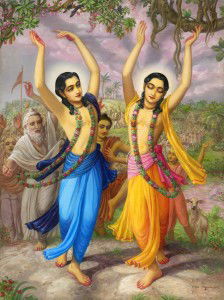 went from door to door, all over India, giving it in the form of kṛṣṇa-nāma with no consideration of who was qualified and who wasn’t. Therefore He is premada, and His mahā-prasāda remnants also bestow kṛṣṇa-prema. Kāmadaṁ ca me– His mahā-prasāda also gives kāma. There are two types of mādhurya-rasa: sambandhātmikā and kāmātmikā. Only the vraja-gopīs are kāmātmikā, and Yaśodā, Nanda, Upananda, Śrīdāmā, Rukmiṇī, Arjuna, and all others are sambandhātmikā. Kāmātmikā is of two types: direct and tat-tad-bhāva-icchā-mayī, which is mañjarī-bhāva, the sentiments of the nitya-sakhīs and the prāṇa-sakhīs. Caitanya Mahāprabhu came to taste kāmānuga sakhī-bhāva and to give tat-tad-bhāva-icchā-mayī, which inspires one to become a pālyadāsī of the gopīs. In the Caitanya-caritāmṛta, it is written that He also tasted pālyadāsī-bhāva, because if He had not tasted it, then how could he give it? Therefore He has tasted Kṛṣṇa in dāsya, sakhya, vātsalya, mādhurya and the many varieties of mādhurya. Because there are three-hundred and sixty-four types of gopīs, He tasted mādhurya in three-hundred and sixty-four ways. The aggregate of all these is Śrīmatī Rādhikā, and no other gopī can always give Kṛṣṇa whatever He desires. Because Mahāprabhu assumed the bhāva of Rādhikā, He tasted it in every way – kāmātmikā, sambandhātmikā , and whatever any sādhaka or perfected devotee could ever taste. Previously all bhāvas up to vātsalya had been given, but not mādhurya, and especially this mañjarī-bhāva. Caitanya Mahāprabhu distributed this, and for ordinary people He gave harināma and the knowledge that they are eternal servants of Kṛṣṇa. Therefore, in this verse, kāmadaṁ ca me means kāmānuga, and within kāmānuga, bhāva-iccha-mayī. He gave it by transmitting His mercy into someone’s heart, as in the case of Rūpa Gosvāmī, and He prayed to His associates that they also would transmit their mercy into Rūpa Gosvāmī’s heart.
went from door to door, all over India, giving it in the form of kṛṣṇa-nāma with no consideration of who was qualified and who wasn’t. Therefore He is premada, and His mahā-prasāda remnants also bestow kṛṣṇa-prema. Kāmadaṁ ca me– His mahā-prasāda also gives kāma. There are two types of mādhurya-rasa: sambandhātmikā and kāmātmikā. Only the vraja-gopīs are kāmātmikā, and Yaśodā, Nanda, Upananda, Śrīdāmā, Rukmiṇī, Arjuna, and all others are sambandhātmikā. Kāmātmikā is of two types: direct and tat-tad-bhāva-icchā-mayī, which is mañjarī-bhāva, the sentiments of the nitya-sakhīs and the prāṇa-sakhīs. Caitanya Mahāprabhu came to taste kāmānuga sakhī-bhāva and to give tat-tad-bhāva-icchā-mayī, which inspires one to become a pālyadāsī of the gopīs. In the Caitanya-caritāmṛta, it is written that He also tasted pālyadāsī-bhāva, because if He had not tasted it, then how could he give it? Therefore He has tasted Kṛṣṇa in dāsya, sakhya, vātsalya, mādhurya and the many varieties of mādhurya. Because there are three-hundred and sixty-four types of gopīs, He tasted mādhurya in three-hundred and sixty-four ways. The aggregate of all these is Śrīmatī Rādhikā, and no other gopī can always give Kṛṣṇa whatever He desires. Because Mahāprabhu assumed the bhāva of Rādhikā, He tasted it in every way – kāmātmikā, sambandhātmikā , and whatever any sādhaka or perfected devotee could ever taste. Previously all bhāvas up to vātsalya had been given, but not mādhurya, and especially this mañjarī-bhāva. Caitanya Mahāprabhu distributed this, and for ordinary people He gave harināma and the knowledge that they are eternal servants of Kṛṣṇa. Therefore, in this verse, kāmadaṁ ca me means kāmānuga, and within kāmānuga, bhāva-iccha-mayī. He gave it by transmitting His mercy into someone’s heart, as in the case of Rūpa Gosvāmī, and He prayed to His associates that they also would transmit their mercy into Rūpa Gosvāmī’s heart.

The following is an excerpt from the book Lord Balarāma The Original Bhakta-Avatāra by Śrīla Gaura Govinda Svāmī Mahārāja, published by Tattva Vicara Publications (Tvpbooks.com)
All the avatāras have assumed the mood of bhakta, bhaktabhāva, because the bhakta, the devotee relishes more than Bhagavān, therefore bhakta-bhāva haite adhika sukha nāhi āra—Kṛṣṇa is the enjoyer, He gets enjoyment and pleasure, but the bhakta, rendering service unto Kṛṣṇa gets more pleasure. Kṛṣṇa then develops greed, “What is it they are receiving more than Me? How can I get it? I must go there as a bhakta.” So He came as bhakta Gaurāṅga Mahāprabhu. A bhakta’s relishment is greater than Bhagavān’s.

The following is an excerpt from the book Lord Balarāma The Original Bhakta-Avatāra by Śrīla Gaura Govinda Svāmī Mahārāja, published by Tattva Vicara Publications (Tvpbooks.com)
Then Kṛṣṇa Himself developed greed for it, “How can I relish My own mādhurya? Without accepting bhakta–bhāva it is impossible. Therefore He accepted bhakta–bhāva and came as Gaurāṅga. In Caitanya-caritāmṛta it is also mentioned,
bhakta-bhāva aṅgīkari’ hailā avatīrṇa
śrī-kṛṣṇa-caitanya-rūpe sarva-bhāve pūrṇa
“Therefore Lord Kṛṣṇa accepted the position of a devotee and descended in the form of Lord Caitanya, who is complete in every respect.”
(Śrī Caitanya-caritāmṛta Ādi-līlā Ādi-līlā 6.109)

The following is an excerpt from a lecture by Śrīla Gaura Govinda Svāmī Mahārāja in Bhubaneswar, on April 30, 1994, published in Kṛṣṇa Kathāmṛta Bindu Issue 247
We should perform nāma-sevā because the chief result of chanting this holy name is Kṛṣṇa prema. Mahāprabhu gives that prema through chanting, which is like an intoxicant. That is mentioned:
mahā-mādaka prema-phala peṭa bhari’ khāya
mātila sakala loka — hāse, nāce, gāya
(Śrī Caitanya-caritāmṛta Ādi-līlā 9.49)
The fruit of love of Godhead distributed by Caitanya Mahāprabhu is such a great intoxicant that anyone who eats it, filling his belly, immediately becomes maddened by it, and automatically he chants, dances, laughs and enjoys.

The following is an excerpt from the book Snāna-Yātrā, Śrī Jagannātha Mahā-Bhāva-Prakāśa by Śrīla Gaura Govinda Svāmī Mahārāja, published by Tattva Vicara Publications (Tvpbooks.com)
So this is the līlā. Mahāprabhu is the combined form of rasa-rāja and mahā-bhāva-mayī, mādanākhya-mahā-bhāva mayī Rādhā.
rasarāja-mahābhāva eka-tanu haiyā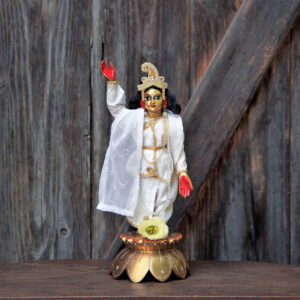
nāma-saṅkīrtana rase jagat mātāiyā
hare kṛṣṇa hare kṛṣṇa kṛṣṇa kṛṣṇa hare hare
hare rāma hare rāma rāma rāma hare hare
I will remain there chanting Hare Kṛṣṇa. I Myself will relish that prema-rasa, that nectarean loving mellow emanating from harināma saṅkīrtana and I will also distribute it to all fortunate jīvas, those are very greedy for it. I will give them an
opportunity to relish it.
The Deity of Mahāprabhu: He is reaching
for the fruit of love of Godhead with His right hand
and also distributing it with His left hand.
Source: Purebhakti.com
Image/Art made possible by Pixabay.com, Krishnapath.org and/or Bhaktiart.net
Unless indicated differently, all verse translations and quotes are from the books
by Śrīla Bhaktivedānta Svāmī Prabhupāda (Vedabase.com)








